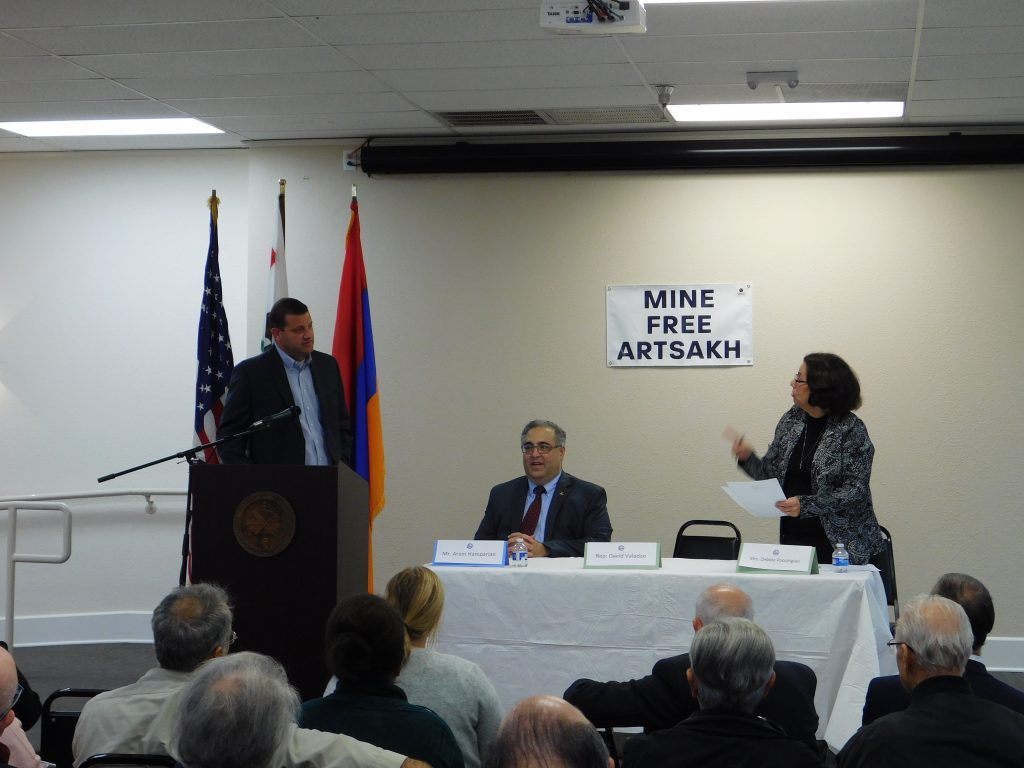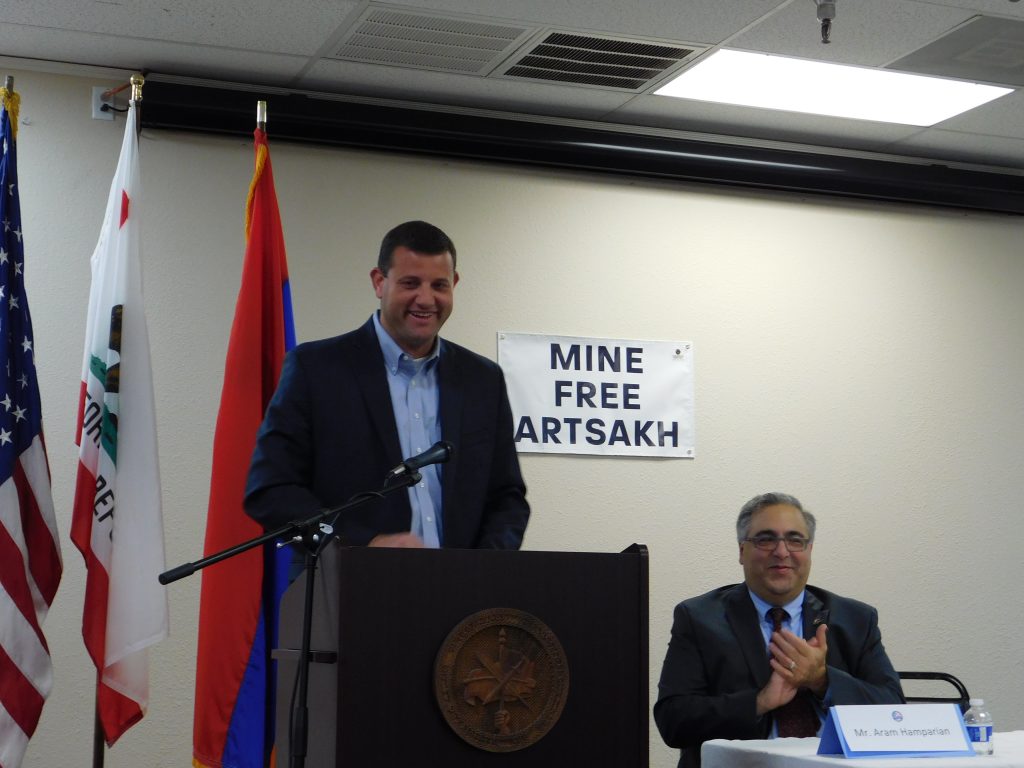FRESNO, Calif.—The Republic of Artsakh will be a safer place in the future, thanks to the efforts of Central Valley Congressman David Valadao (R-Calif.) Earlier this year, Congress adopted an amendment by Valadao to continue providing life-saving funds for the removal of land mines around the villages of Artsakh. The Hanford-based representative who serves on the House Appropriations Committee was in Fresno to talk about the measure and his recent trip to Armenia and Artsakh during a community gathering held at the Garo and Alice Gureghian Armenian Cultural Center and sponsored by the Central California branch of the Armenian National Committee of America (ANCA).
“Whenever a member of Congress would have an issue with (the amendment), the simple question was ‘what issue is there with removing land mines that are blowing up farmers,” remarked Valadao in emphasizing the humanitarian purpose of his resolution. “I mean, who’s going to argue against that?”
The Valadao amendment will provide $1.5 million in U.S. assistance to help the HALO Trust in its goal to eradicate mines, bombs, and other munitions that were laid during the peak of the Artsakh-Azeri conflict in the early 1990s. Since 2001 when the international humanitarian organization began its mission in Artsakh, the HALO Trust has removed over a quarter-million explosives from the countryside, thus bringing otherwise fallow land back into agricultural production. Along with the making the country safer and more productive, the de-mining operation employs hundreds of locals, who have an intimate knowledge of the landscape.
“These folks spend a lot of hours digging around a little land mine just to find it, secure it, and essentially blow it up… To have the opportunity to see them and go through the experience…made me proud to support that,” said Valadao, who co-chairs the Congressional Armenian Caucus.
The event also featured ANCA Executive Director Aram Hamparian, who gave some background on U.S. assistance to Artsakh while emphasizing the significance of the amendment. The uphill battle to secure funds for the region began shortly after the 1994 ceasefire agreement, at a time when the State Department still regarded Artsakh as part of the Republic of Azerbaijan. Hamparian explained that U.S. appropriations in general and the Valadao’s legislation in particular achieve multiple objectives at various levels. Most obviously, the funds serve a humanitarian purpose in creating a safer environment for the civilians and especially the children of Artsakh. Additionally, there is the political dimension of such assistance. Even though the United States does not officially recognize the Republic of Artsakh as a sovereign county, such funds are administered in Stepanakert and not by the Azeri authorities in Baku—an implicit but clear acknowledgement by the U.S. that Artsakh is effectively a functioning and autonomous Armenian state.
Perhaps most encouragingly have been the statements of U.S. Secretary of State Rex Tillerson about the de-mining amendment, who affirmed that his department “remains focused on completing the demining as quickly and as thoroughly as possible.” Hamparian recalled that appropriations for Artsakh were viewed reluctantly if not negatively by previous administrations. Tillerson’s comments may signal a more constructive approach by the State Department on the question of Artsakh’s self-determination.

(L to R) Congressman David Valadao, ANCA Executive Director Aram Hamparian, and former Fresno County Supervisor Debbie Poochigian (Photo: ANCA of Central California)
During the question and answer part of the program, Berj Apkarian, Armenia’s Honorary Consul in Fresno, expressed his gratitude to the valley congressman, adding that his visit to Artsakh made an important statement to other US lawmakers. As in the past, this year’s congressional delegation—which also included representatives Jackie Speier (Calif.) and Frank Pallone (N.J.), Anna Eshoo (Calif.), Tulsi Gabbard, (Hawaii) and James Sensenbrenner (Wis.) as well as ANCA Chairman Raffi Hamparian—was advised by the State Department not to travel to Artsakh for fear of reprisals by the Republic of Azerbaijan. Following their tour of Artsakh, Valadao, Pallone, and Gabbard were added to Azerbaijan’s infamous blacklist, which currently comprises hundreds of international officials, dignitaries, journalists, and celebrities who have openly traveled to the region.
“I didn’t think being [in Artsakh] would get me blacklisted by another country for doing something that most people would consider as a good thing,” commented Valadao.
As part of the congressional delegation’s tour of Armenia, Valadao made various stops in Yerevan, including the Armenian Genocide Monument (Tsitsernakaberd) and the American University of Armenia, where he was impressed by the initiative of the college’s business students.
The event was emceed by Debbie Poochigian, former Fresno County Supervisor and long-time supporter of the Central Valley’s Armenian Community.
The post Valadao Discusses Life-Saving Demining Effort in Artsakh appeared first on The Armenian Weekly.
Source: Armenian Weekly
Link: Valadao Discusses Life-Saving Demining Effort in Artsakh

